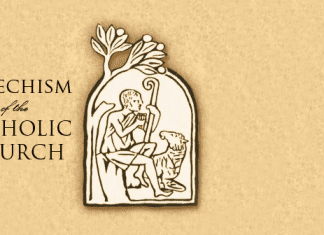Catechism of The Catholic Church #2526
2526 So called moral permissiveness rests on an erroneous conception of human freedom; the necessary precondition for the development of true freedom is to let oneself be educated in the moral law. Those in charge of education can reasonably be expected to give young people instruction respectful of the truth, the qualities of the heart, and the moral and spiritual dignity of man.
Catechism of The Catholic Church #2639
2639 Praise is the form of prayer which recognizes most immediately that God is God. It lauds God for his own sake and gives him glory, quite beyond what he does, but simply because HE IS. It shares in the blessed happiness of the pure of heart who love God in faith before seeing him in glory. By praise, the Spirit is joined to our spirits to bear witness that we are children of God, testifying to the only Son in whom we are adopted and by whom we glorify the Father. Praise embraces the other forms of prayer and carries them toward him who is its source and goal: the "one God, the Father, from whom are all things and for whom we exist."
Catechism of The Catholic Church #2490
2490 The secret of the sacrament of reconciliation is sacred, and cannot be violated under any pretext. "The sacramental seal is inviolable; therefore, it is a crime for a confessor in any way to betray a penitent by word or in any other manner or for any reason."
Catechism of The Catholic Church #1459
1459 Many sins wrong our neighbor. One must do what is possible in order to repair the harm (e.g., return stolen goods, restore the reputation of someone slandered, pay compensation for injuries). Simple justice requires as much. But sin also injures and weakens the sinner himself, as well as his relationships with God and neighbor. Absolution takes away sin, but it does not remedy all the disorders sin has caused. Raised up from sin, the sinner must still recover his full spiritual health by doing something more to make amends for the sin: he must "make satisfaction for" or "expiate" his sins. This satisfaction is also called "penance."
Catechism of The Catholic Church #1421
1421 The Lord Jesus Christ, physician of our souls and bodies, who forgave the sins of the paralytic and restored him to bodily health, has willed that his Church continue, in the power of the Holy Spirit, his work of healing and salvation, even among her own members. This is the purpose of the two sacraments of healing: the sacrament of Penance and the sacrament of Anointing of the Sick.
Catechism of The Catholic Church #1808
1808 Fortitude is the moral virtue that ensures firmness in difficulties and constancy in the pursuit of the good. It strengthens the resolve to resist temptations and to overcome obstacles in the moral life. the virtue of fortitude enables one to conquer fear, even fear of death, and to face trials and persecutions. It disposes one even to renounce and sacrifice his life in defense of a just cause. "The Lord is my strength and my song." "In the world you have tribulation; but be of good cheer, I have overcome the world."
Catechism of The Catholic Church #903
903 Lay people who possess the required qualities can be admitted permanently to the ministries of lector and acolyte. When the necessity of the Church warrants it and when ministers are lacking, lay persons, even if they are not lectors or acolytes, can also supply for certain of their offices, namely, to exercise the ministry of the word, to preside over liturgical prayers, to confer Baptism, and to distribute Holy Communion in accord with the prescriptions of law."
Catechism of The Catholic Church #2780
2780 We can invoke God as "Father" because he is revealed to us by his Son become man and because his Spirit makes him known to us. the personal relation of the Son to the Father is something that man cannot conceive of nor the angelic powers even dimly see: and yet, the Spirit of the Son grants a participation in that very relation to us who believe that Jesus is the Christ and that we are born of God.
Catechism of The Catholic Church #272
272 Faith in God the Father Almighty can be put to the test by the experience of evil and suffering. God can sometimes seem to be absent and incapable of stopping evil. But in the most mysterious way God the Father has revealed his almighty power in the voluntary humiliation and Resurrection of his Son, by which he conquered evil. Christ crucified is thus "the power of God and the wisdom of God. For the foolishness of God is wiser than men, and the weakness of God is stronger than men." It is in Christ's Resurrection and exaltation that the Father has shown forth "the immeasurable greatness of his power in us who believe".
Catechism of The Catholic Church #2226
2226 Education in the faith by the parents should begin in the child's earliest years. This already happens when family members help one another to grow in faith by the witness of a Christian life in keeping with the Gospel. Family catechesis precedes, accompanies, and enriches other forms of instruction in the faith. Parents have the mission of teaching their children to pray and to discover their vocation as children of God. The parish is the Eucharistic community and the heart of the liturgical life of Christian families; it is a privileged place for the catechesis of children and parents.














